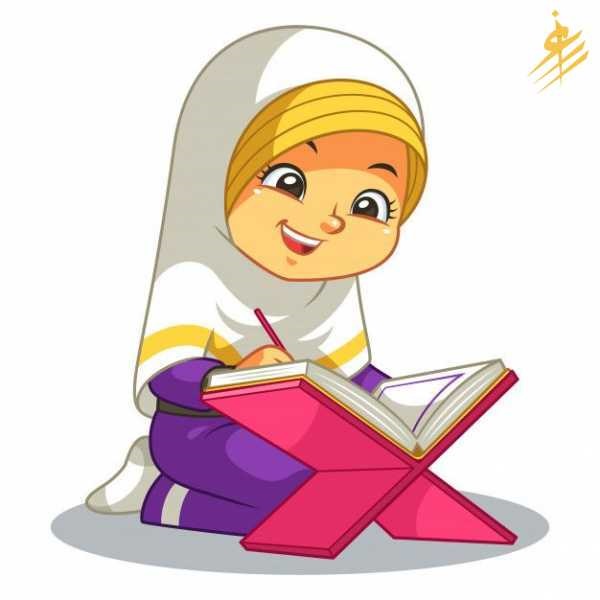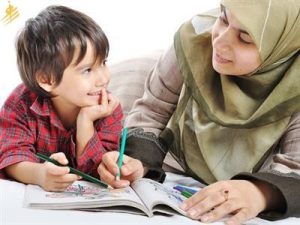The Messenger (peace and blessing of Allah be upon him) dealt with young children in a manner based on compassion, mercy, softness and consideration for their conditions. The prophet had the best dealing with children, and about his educational methods in dealing with children in Quran and Sunnah, we will learn about the opinions of law, psychology and educational professor through these lines.
The children’s upbringing by the prophet (peace and blessing of Allah be upon him) produced a generation of leaders
The negative messages transmitted by parents may be destructive and may cause sores in their children’s personalities that wouldn’t be healed and effects that are difficult in the long run to disappear, just as satisfying the children’s need for freedom is through finding a comfortable atmosphere, an interlocutor that establishes loyalty to values using the glue of love, thus the definition of freedom and it’s limits would be determined calmly and with confidence and such accountability makes the parents authorities respected by their children.
Methods of raising children by the Prophet in Islam
The Prophet’s commandments to children are varied and the most important ones are as the following:
The Prophet’s approach to respect
Respect for children’s decisions is a requirement, just as it is for every human being, respect is a state of feeling the self- steam and be proud of it without arrogance or exaggeration. Parents have an inferior view of their son that suppresses his talents and deprives him of the simplest human advantages, which are the enjoyment of a free idea, a legitimate aspiration, a decent life, a satisfying morsel and a good night’s sleep.
The mistreatment of a person will plunge him and his society into psychological and social extremes, the result of which will be a comprehensive loss for all, God Almighty said: “Pay with what is better and if there is enmity between you and him as if he is an intimate friend”, also the Almighty said: “And say to my servants to speak with what is better”. As for the little one there is no way to raise him respectfully unless the respect comes from adults and children who are around him, just as the adults, with what they constitute of the authorities dominating the personality of the little one, They have the greatest impact on rebuilding the psyche of the young or destroying it. Perhaps one of the most important ways of conveying respect to the young is through our messages of understanding him.
Debate with children
The serious attempts to make dialogue with young child and understand them, reflect many messages that the young take seriously and are committed to their content, because the child believes everything we say to them and carry it in themselves, we form authorities that control the destinies of our children because they are dependent on us in their childhood. So if we tell them something about themselves, it must be the same for them.
As adults, sometimes we feel deeply affected that some of us may have lost balance, frustrated, or perhaps raised our destiny when we listen to the directives, fatwas, or decisions of those we handed over to them from the religious, administrative, or social authorities all these and we are mature, rational and independent, what is the condition of the dependent child who is completely dependent on adults? The child, as Imam Al-Ghazali says: “A precious jewel and he is a fidelity in the neck of his parents.” Our poet said, indicating the danger of adults in formulating the psyche of children: “And the young boys grow up on what their father used to do”.
Creativity laws
Creativity in communication is a serious decision to change the ability to win the trust of adolescents, girls and boys. It is taken by the educator, although the teacher is not strong enough to get it and the performer is unable to do so.
And the child in the stage of personality formation that begins with adolescence from 7-21 years old need five laws that parents follow to help them communicate with their children easily and creatively and they are: self-sufficiency is a success, reliability is a failure, avoidance of cruelty and coddling, as well as exposure to all areas of creativity, learning the seeds of Science because it is the lifeline and using the correct method in their upbringing.
Creative skills for children
Skills that parents can apply to reach creativity in communicating flexibly and easily with the teenager, including non-interference in the quality of the son’s friends, unless there is complete knowledge of them and they have to find an alternative for these friends so that the parents do not infringe on their son’s right to choose his friends, but rather give him the concepts for the correct criteria in how to choose friends and then leave him a space of freedom for authentication. As for finding an alternative, the parents should clarify the criteria to the son. For example, the father tells him: Your friend must be loyal to his parents, committed to his prayers, a believer, honest and characterized by good morals, or to make him accompany Groups, not individuals, because the group has diversity, so the choice becomes greater. Therefore, the son must be given the freedom to choose his friends, but within the criteria and concepts that I show him without imposing them on him. Rather, I let him get the experience with his heart and mind to live with them i conviction.
The most famous ways of creativity
One of the ways of creativity in communicating with children is also using the story in the dialogue to combine the mind and the heart. Stories are among the most successful methods in attracting the attention of the teenager and exciting them, but on the condition that the parents are fluent in the method of dialogue and use the correct means in telling the story.
Understand your son
Appreciation is the beginning of understanding and observance, then giving plenty of time to our children. As for the elements of appreciation, they are: “understand me,” which is a very important requirement. The second is “take care of me” by respecting the son’s psychology. As for the appreciation of “wait for me,” parents must be patient in their dealings with the son and give him opportunities to Express what he wants and listen to him. As for the “Thrill me” element, it is for appreciating the son’s personality and it relies on monitoring and accountability by making the son’s relationship with the parents official, away from suspense and excitement.
Mercy according to Sunnah of the Prophet
Mercy has been represented in its finest meanings and most beautiful forms in the Messenger of God (peace and blessing of Allah be upon him), as he is the mercy that is dedicated upon the world.
The Almighty said: (And We did not send you except to be a mercy to world” (Surah Al-anbiya: 107). The mercy of the Holy Prophet included the child and surrounded him, so his mercy towards the child was a method that all servants follow him in their dealings with children in general.
A child differs greatly from an adult person and this difference includes behavior, body and mind, so God Almighty has lifted the reckoning and punishment of this weak being. The prophet said: “there is no asking on there: anyone who sleeps until wakes up, the young until he grows up and on behalf of the afflicted until he becomes sane.”
Childhood is a very sensitive period, so it is necessary to take care of the child during this period and take care of him. This is what the Messenger of Allah (peace and blessing of Allah be upon him) was known for, who laid firm foundations in how to deal with children and taking into account their needs.

Kindness to children in Islam
The child is in constant need of the sympathy and love of others, just as he is nourished physically to grow up, so he needs to be nourished emotionally through those who are around him and this is what the Messenger of God (peace and blessing of Allah be upon him) did not neglect. The Messenger kissed al-Hassan bin Ali (may God be pleased with him) while he was sitting with al-Aqra bin Habis. Al-Aqra said: “I have ten children and I have not kissed any of them”, the messenger looked at him and said” who doesn’t show mercy will be shown no mercy”.
And he used to carry his grandson, Al-Hassan bin Ali bin Abi Talib ( may Allah be pleased with him), he put him on his honorable shoulders, carried him, then hugged him and prayed to God, saying: “Oh God, I love him, may you love him too.”
You can also read about: Etiquettes of eating and drinking for children.
The Messenger of God playing with children
The child is in constant need of playing, adventure and fun, because of the positive repercussions and effects that has on his personality and thoughts. Play allows him to experiment with abilities, acquire more knowledge, overcome difficulties and entertain himself.
Here we record the humility of the Holy Prophet (peace and blessing of Allah be upon him) with children and their participation in their toys and their distractions. On the authority of Jaber, he said: I entered upon the Prophet (peace and blessing of Allah be upon him) while he was walking on four legs and on his back was Al-Hassan and Al-Hussein (may God be pleased with them both).
(Praise for children) was the approach of the Holy Prophet
- He said: It is nice to give our children thanks for the good work they have done.
- As gratitude urges them to give more and encourages them to move forward to do good deeds. The Messenger of God (peace and blessing of Allah be upon him) was keen to thank and praise every child who did a good deed.
- Bin Abbas said the Messenger of God included me and said: “O God, teach him the Book.”
- Bin Abbas said: I put an ablution bowl for the Prophet, he asked: Who put this on? Bin Abbas replied: “me”, the prophet said: “Oh God, grant him understanding the religion”.
- And when Anas served the Messenger of God, the messenger prayed for him: “Oh God, increase his wealth and his children and bless him in what you gave him”.
The Messenger of God sends peace to the children

- He added: Many adults ignore children and do not even greet them. The Holy Prophet humbled himself to this group of people and never hesitated to greet them.
- The Prophet passed by children playing. He said to them: “Peace be upon you, boys.”
- On the authority of Anas bin Malik (may God be pleased with him) that he passed by two boys and greeted them and said: The Prophet used to do that.
- He did not deprive them of the participation in peace with adult.
- He said: “The little one greets the old, the passer-by greets the sitting person and the few greets the many”.
The Messenger of God teaches religion to children
The Messenger of God (peace and blessing of Allah be upon him) was always seeking to teach religion to children and urged them to learn and know. One day he accompanied Abdullah bin Abbas and said to him: “O boy, I am teaching you words. Save God and He will protect you. Save God and you will find Him towards you. If you ask, ask God, and if you seek help, then seek help from God and know that if the nation gathered to benefit you with something, they would not benefit you except with something that God had ordained for you and if they gathered together to harm you with something they would not harm you except with something that God had ordained for you”.
The Messenger of God develops children’s imagination
On the authority of bin Omar (may God be pleased with them both) he said: We were with the Messenger of God (peace and blessing of Allah be upon him) he said: Tell me if there’s a tree that resembles a Muslim or a Muslim man, whose leaf does not fall and yields its fruit every once in a while”. Bin Omar said: I thought it would be the palm tree and I saw Abu Bakr and Omar don’t speak, so I hated to speak, when they did not say anything, the Messenger of God said: ‘It is the palm tree”. When we got up, I said to Omar: “O father, by God, it thought the answer is the palm tree”, so he asked: “What prevented you from speaking?” I replied: “I did not see you two talking, so I hated to speak or say something”. Omar said: “Because of what you said, it would be more beloved to me if you spoke up rather than say this and that”.
What do these children need other than ears listen to them and a big heart loves them?. Let us adhere to the guidance of the Prophet (peace and blessing of Allah be upon him) in raising our children according to the principles of Islam and giving them a healthy upbringing. Let be our goal from this upbringing is Allah’s pleasure.
Download jeras app from here, for more social, religious and educational articles.






